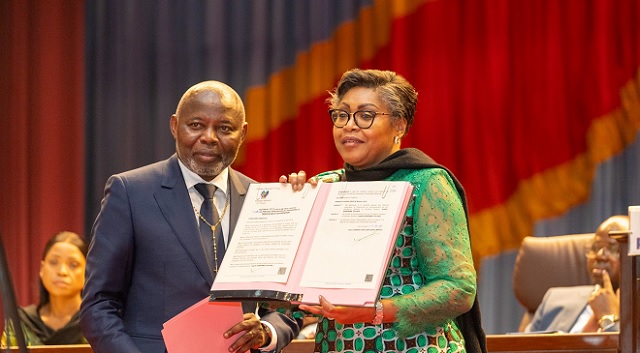Judith Suminwa Tuluka was sworn in early Wednesday as the first female prime minister of the Democratic Republic of the Congo (DRC), with an “ambitious and detailed” action plan that will cost 92.9 billion U.S. dollars over the next five years.

Before the National Assembly, the lower house of parliament, Tuluka and the other 54 new Cabinet members officially took office after deputies adopted Tuluka’s action plan with an absolute majority.
A total of 397 deputies voted in favor of the new government’s program, after hours of debating.
BREAKING THE GLASS CEILING
Tuluka, while presenting her action plan, said she was proud to have broken the “glass ceiling” to be the first Congolese woman to serve as prime minister. Out of the new government’s 55 members, 18 are female.
“By assuming this position, I am fully aware of the historical importance of this moment and the symbolism of this appointment for the Congolese nation,” she said. “I feel both the weight of the responsibility on me and an immense pride in the idea of representing within the republic, the culmination of the efforts of all Congolese men and women tending to break the famous glass ceiling to produce equality.”
This new government, unveiled at the end of May 2024, consists of 55 members, including the prime minister, six deputy prime ministers, and 10 state ministers.
Apart from the prime minister, there are 54 members in the Cabinet, and 30 of them are new faces. Fifteen ministers from the previous government were reappointed to their original positions, and nine others were reappointed but reassigned to different functions.
With a master’s degree in applied economics from the Universite Libre de Bruxelles of Belgium, Tuluka was appointed state minister for planning in March 2023.
From 2020 to 2023, she also served as deputy coordinator of the Presidential Strategic Monitoring Council, an entity affiliated with the DRC presidential office.
Tuluka, 56, was one of the targets of the foiled coup attempt on May 19. The coup plotters could not identify her residence and then turned to that of Vital Kamerhe, the current president of the National Assembly who inaugurated Tuluka Tuesday.
AMBITIOUS PLAN
The “ambitious and detailed” action plan of the new government “will be a valuable tool to guide policies,” with an estimated cost of 92.9 billion dollars for her five-year term, according to Tuluka.
In the action plan, she promised to “create more jobs and protect the purchasing power of households” in the DRC, a country ranked as the fourth-poorest country in the world by the World Bank, despite its wealth in strategic minerals.
Tuluka pledged to ensure macroeconomic stability and improve the business climate, to “promote the image of the DRC as a reliable destination for foreign investment in the mining and hydrocarbon sectors,” to better “redistribute the fruits of economic growth,” and ensure that energy sources “meet the needs of the population.”

She promised the new government would lay the groundwork for an “emerging Congo” by creating around 2.6 million jobs and an academy of mathematics and artificial intelligence in Kinshasa, the capital of the DRC.
Faced with chronic conflicts, notably the resurgence of the Movement of March 23 rebellion in the eastern part of the country, Tuluka said the government remains committed to securing its people with better-funded and equipped defense forces, as well as proactive diplomacy, to eradicate armed groups operating in the country.
National security constitutes the second pillar of her agenda and represents 20 percent of the overall costs of the government plan.
“To you, who are in the east of the country who live the afflictions of war, fear in the stomach, I would like to express here our firm willingness to work for the return of lasting peace in the eastern part,” Tuluka said.
The new prime minister also promised to build 3,750 km of priority roads and 400 ports, including the deep water port of Banana, and lay 50,000 km of fiber-optic network across the country.
Tuluka pledged to ensure access to social services, strengthen the efficiency of public services, combat climate change, including raising the Inga hydropower project’s productivity, pursue universal healthcare coverage, and finalize a biometric census of public servants.
COMPROMISES
The formation of the new government was unveiled in the early hours of May 29, more than four months after President Felix Tshisekedi’s inauguration.
In the general elections held in December 2023, Tshisekedi was reelected for a second term, with the Sacred Union coalition, composed of the Union for Democracy and Social Progress of the president and his allied parties, winning the majority in the 500-seat National Assembly.
After her appointment, Tuluka, tasked with forming her government team, proposed a slimmer government, cutting its size to 45 members, including ministers and deputy ministers.
“It’s a coalition of different parties, there were discussions… compromises,” said Erik Nyindu, director of communications for the presidency, explaining why the government formation took so long.
After the long-awaited installation of this government, the race for the presidency of the Senate, the upper house, is expected to be intense, with the election scheduled for June 15. Tuluka’s predecessor, Jean-Michel Sama Lukonde, is running for the position.
Tuluka’s inauguration was somewhat marred by a stampede at the entrance to the People’s Palace, where the DRC parliament is located.
At least five people, including a police officer, were injured in the stampede, which occurred as activists, parliamentarians and journalists tried to access the venue, according to local media.
Source: Xinhua
